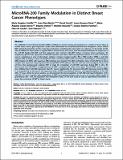Por favor, use este identificador para citar o enlazar a este item:
http://hdl.handle.net/10261/62779COMPARTIR / EXPORTAR:
 SHARE SHARE
 CORE
BASE CORE
BASE
|
|
| Visualizar otros formatos: MARC | Dublin Core | RDF | ORE | MODS | METS | DIDL | DATACITE | |

| Título: | MicroRNA-200 Family Modulation in Distinct Breast Cancer Phenotypes |
Autor: | Castilla, María Ángeles CSIC; Díaz-Martín, J. CSIC ORCID; Sarrió, David CSIC ORCID; Romero-Pérez, Laura CSIC ORCID; López-García, María Ángeles CSIC; Vieites, Begoña CSIC; Biscuola, Michele CSIC ORCID; Ramiro-Fuentes, Susana CSIC; Isacke, Clare M.; Palacios Calvo, José CSIC ORCID | Fecha de publicación: | 2012 | Editor: | Public Library of Science | Citación: | PLoS ONE 7 (2012) | Resumen: | The epithelial to mesenchymal transition (EMT) contributes to tumor invasion and metastasis in a variety of cancer types. In human breast cancer, gene expression studies have determined that basal-B/claudin-low and metaplastic cancers exhibit EMT-related characteristics, but the molecular mechanisms underlying this observation are unknown. As the family of miR-200 microRNAs has been shown to regulate EMT in normal tissues and cancer, here we evaluated whether the expression of the miR-200 family (miR-200f) and their epigenetic state correlate with EMT features in human breast carcinomas. We analyzed by qRT-PCR the expression of miR-200f members and various EMT-transcriptional inducers in a series of 70 breast cancers comprising an array of phenotypic subtypes: estrogen receptor positive (ER+), HER2 positive (HER2+), and triple negative (TN), including a subset of metaplastic breast carcinomas (MBCs) with sarcomatous (homologous or heterologous) differentiation. No MBCs with squamous differentiation were included. The DNA methylation status of miR-200f loci in tumor samples were inspected using Sequenom MassArray® MALDI-TOF platform. We also used two non-tumorigenic breast basal cell lines that spontaneously undergo EMT to study the modulation of miR-200f expression during EMT in vitro. We demonstrate that miR-200f is strongly decreased in MBCs compared with other cancer types. TN and HER2+ breast cancers also exhibited lower miR-200f expression than ER+ tumors. Significantly, the decreased miR-200f expression found in MBCs is accompanied by an increase in the expression levels of EMT-transcriptional inducers, and hypermethylation of the miR-200c-141 locus. Similar to tumor samples, we demonstrated that downregulation of miR-200f and hypermethylation of the miR-200c-141 locus, together with upregulation of EMT-transcriptional inducers also occur in an in vitro cellular model of spontaneous EMT. Thus, the expression and methylation status of miR-200f could be used as hypothetical biomarkers to assess the occurrence of EMT in breast cancer. © 2012 Castilla et al. | URI: | http://hdl.handle.net/10261/62779 | DOI: | 10.1371/journal.pone.0047709 | Identificadores: | doi: 10.1371/journal.pone.0047709 issn: 1932-6203 |
| Aparece en las colecciones: | (IBIS) Artículos |
Ficheros en este ítem:
| Fichero | Descripción | Tamaño | Formato | |
|---|---|---|---|---|
| journal.pone.0047709.pdf | 524,16 kB | Adobe PDF |  Visualizar/Abrir |
CORE Recommender
PubMed Central
Citations
52
checked on 08-may-2024
SCOPUSTM
Citations
91
checked on 10-may-2024
WEB OF SCIENCETM
Citations
85
checked on 28-feb-2024
Page view(s)
390
checked on 13-may-2024
Download(s)
241
checked on 13-may-2024
Google ScholarTM
Check
Altmetric
Altmetric
Artículos relacionados:
NOTA: Los ítems de Digital.CSIC están protegidos por copyright, con todos los derechos reservados, a menos que se indique lo contrario.
